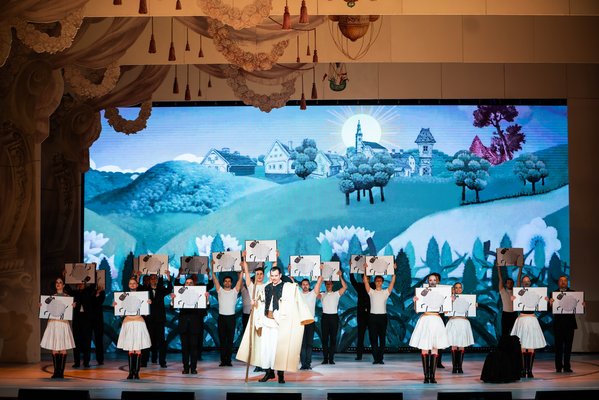
JOHN THE VALIANT
14 September 2024, 11 a.m.
In Brief
Singspiel in three parts, in Hungarian, with Hungarian and English surtitles
“Such a wonderful tale. Pongrác Kacsóh followed in the tracks of the poet without wiping off the butterfly wing scale with rough hands; his fantastic, gorgeous music is distinctly different from any operetta we have heard before with its Hungarian motives and genuine folk style”, reports on the 1904 premier of John the Valiant the newspaper called Újság. It might sound incredible, but the title role was played by the great prima donna Sári Fedák. “When I had sung ‘A single rose says it better’, the fate of the work was sealed. Everyone was crying in the audience, and I cried with them.” There was hardly a season since its opera house premier in 1931 when it was not included in the programme. With John the Valiant, the OPERA honoured the 200th anniversary of Sándor Petőfi’s birth in 2023.
Details
- Location
- Eiffel Art Studios – Miklós Bánffy Stage
- Date
- Sept. 14, 2024
- Start time
- 11 a.m.
- End time
- 2:15 p.m.
Events
Premiere: March 10, 2023
Synopsis
Hussars arrive in the village to recruit lads. A war has broken out, the Turks attacked France, and the legion of hussars are going into battle to aid the King of France. The tricolour flag is brought in for the girls to adorn it with ribbons. Bagó appears, who is hopelessly in love with Iluska, the most beautiful maiden in the village, and leads the hussars to her to adorn the Hungarian flag. The poor orphaned girl is tortured by her evil stepmother, her only happiness is the love of another orphan, the handsome shepherd boy, Johnny Corn. However, the evil stepmother hires the hayward to drive Johnny's flock out of bounds and call for the people of the village. Johnny must escape. He says goodbye to his Iluska, enlists as a hussar, and goes to see the world. Still, he promises Iluska he will never forget her and will come back for her from a hundred deaths.
Act II
The French royal court is filled with excitement while Bartolo, master of the court, monitors the battle situation through his spy-glass and relays it to the princess. Leading his hussars, Johnny Corn arrives and drives the Turks away. The king names him John the Valiant for his heroism and offers him half his kingdom and his daughter's hand in gratitude. The sound of a flute is heard, Bagó arrives with the sad news: Iluska was tortured to death by her evil stepmother. He has brought a rose from Iluska's grave as a memento. With a broken heart, Johnny says goodbye to the French court and sets off with Bagó to visit Iluska in death.
Act III
The wanderings of Johnny and Bagó lead them to the Lake of Life, where they hear a strange rustling of wings. The evil stepmother tries to lure them away from the lake in the form of an ugly witch, but Bagó recognizes her, and Johnny throws the rose torn from Iluska's grave into the Lake of Life. Flowers and roses emerge from the lake, and Fairyland appears with the fairy queen: Iluska. The two lovers happily embrace each other, Bagó bids them farewell and asks for Johnny's flute. Iluska persuades her loved one to stay with her in Fairyland forever. Johnny agrees, the ceremony begins, but Johnny's heart is aching for his homeland. He hears the sound of flute, he longs to go to the village again, home to beautiful Hungary. Iluska runs after Johnny, and they arrive home embracing each other, united in eternal love.
Gallery
Reviews
"And although the Opera does not advertise it as a children's performance, our first impression of Máté Szabó's direction is that it is indeed a children's performance, and the treatment of the prose contributes significantly to this. (...) In the case of John the valiant, the heart-shaped soutache on the hussars' uniforms simultaneously represents his love for Iluska and the love he felt for his village. That is why it comes as no surprise that he is ready to leave Fairyland to return home. And all of this is realized so naturally in Máté Szabó's direction that we don't think it could happen any other way."
Péter Jenei, Pótszékfoglaló
